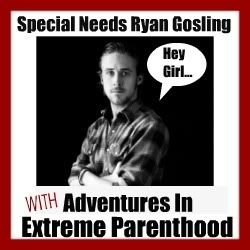 |
| You can relax later. We've got a schedule to keep! |
Leslie and I took Lily to her special magic autism doctor. Her appointment was at 5:00. If we finished quickly we could still drive across town and catch the start of Emma's softball game at 6:00, or possibly catch some of it at least.
I left work early to meet them at the doctor's office. When I got there, Leslie had Lily in the back getting weighed and measured.
"How much did she weigh" I asked after greeting them both with kisses.
"34 lbs," Leslie replied.
I shook my head. "That's lighter than last time, isn't it? What'd she weigh last time?"
Leslie shook her head tiredly. "I think it's lighter," she said, "but I didn't ask about last time."
We crossed the room and took seats in the waiting area. Leslie told the nurse we needed to be somewhere at 6:00 if they could get us in sooner rather than later. The doctor is busy though, and the people before us got there late. It was 5:15 already.
Lily was being so good. She sat at the little table in her little chair and leafed through little books. She finished with one before moving on to the next rapid-fire, flipping the pages to the end before flinging the book aside for a new one.
"Lily, pick up the book and put it away, baby," I said. She walked to the book and picked it up from the floor, plopping it on top of the bookcase in the doctor's waiting area. Good enough, I thought. She picked up a new book and started looking at it. Standing and looking at books is bad business. When she stands to look at them, they end up ripped, so we told her to sit, and she did.
I looked at the clock. It was 5:30. I walked over to the sign in sheet to see when the people before us got in for their appointment. In the leftmost column is a name, in the middle column is their arrival time: 4:20, in the rightmost column is their appointment time: 3:30; 50 minutes late. So, because these assholes can't get to their appointment on time, we're going to pay the price, apparently.
"I'm going to tell her if we can't get in in the next 15 minutes, we'll have to reschedule. Does that sound fair?"
Leslie agreed and I wandered over to the receptionist to let her know. She told me she'd inform the doctor.
10 minutes later our appointment started.
He's a fast talker with all the numbers in his head and he referenced half a dozen studies and three "international" conferences he attended in the past six months since we last saw him. He started asking questions. I got the distinct impression, as I did the last time, that Lily is jumbled together with other kids being seen at this busy practice. He asked things like, "is she on any supplements yet?" In fact, she is. She was six months ago when he saw her too. And six months prior to that.
He added things to her supplemental diet again. I spoke up, "She's not a spectacular supplement taker. Is there any way to combine some of these things in a single pill or liquid?" He consulted his notes and added something else instead. Four new supplements to bolster the four she's already taking. Outstanding.
"It's the consensus of autism treatment doctors," he told us.
"We'll give it a try," I reassured, after explaining that our big concerns with new supplements are her sleep and appetite.
He asked another question that made me wonder if he had any idea who Lily even was, "Is she still eating well?"
I look confusedly at Leslie. "Still eating well? She's never eaten well."
He attempted to clarify, " when you first started seeing me she was eating well."
"When we had the old TSS she could get her to eat pretty well," Leslie offers by way of rescue, "but she cycles in and out of foods, so sometimes she likes things and sometimes she doesn't."
I've gotten impatient with the question though, probably because regardless of why he's asking it, it makes it seem as if he isn't really paying attention, "No. If the baseline of her eating is when we started seeing you then no. Her eating has gotten steadily worse since we changed wrap services. Yes, her food preferences cycle. She'll go months eating a preferred food and then she'll hate that food for months and not allow it past her lips. But regardless of what her preferred foods are, she is not eating well."
Then he said the one thing guaranteed to set my wife off. It's a testimony to how overwhelmed she is that she didn't jump over his laptop and start bludgeoning him with his office chair. "You need to get more volume of food in her," He said. She just looked at me.
No shit. No fucking shit, doctor. He saw the skeptical look on my face. "You think I'm crazy -," he began.
"No," I interrupted, "I don't think you're crazy. We completely agree. And if we COULD be getting more volume of food in her, believe me, we would. We keep feeding her until she resists, and then we continue past that. It's not like we cut her off when she reaches some limit. We want her to eat. But we'll sure try."
"Does she feed herself?"
"No. Not really. Finger food."
"I really encourage you to get her feeding herself."
Again, my skeptical look startles him out of whatever theoretical playbook he's reading. "We're back to the age-old question, Doctor, which is more important: teaching her to feed herself, or getting food in her? You have her weight from the last visit?" He nodded at this, looking at his laptop screen and I continued, " She weighs 34 pounds now. I'm almost positive that's less than what she weighed six months ago."
Leslie added, "When she feeds herself she's even less likely to eat well."
He made a point that kids often fight being fed because it's a control issue. We understood. "But," Leslie offered, "she can't really hold the spoon or fork properly to get the food in her mouth."
Lily cheerfully continued perusing the books in the doctor's examination room, moving from one to another to another until she started the process over again with the first. She periodically glanced up to say, "Hi doctor," and giggle shyly before returning to her page turning.
The clock ticked by and we exchanged questions and answers, suggestions and prescriptions. It was 6:30. Emma's game had started. It was a thirty minute drive, but we might still catch the last inning or two if the appointment ended soon.
But it didn't. At 7:00 we left. We had a prescription for a baseline EKG (EEG? I always confuse the two), A referral to a nutritionist, a referral to a vision therapist, a recommendation to visit an allergist, a plea to visit the audiologist (for baseline hearing test for her file), four supplements and a push to get her to feed herself. More appointments, more stress.
In the meantime the game was over, Emma's team lost. We missed it.
Tomorrow at 3:00 we have an appointment with a pediatric psychiatrist to look at possible medications to control impulsivity. When we brought this up with our autism doctor, he seemed put out that we weren't using him to do that, but I can't worry about his feelings.
At 6:00 we need to get Emma to the school for her Orchestra recital.
Friday is Emma's dance recital at 7:00, she'll need to be there by 6:00.
Saturday? I'm not really sure. . . I can only keep track of about two days at a time anymore.























